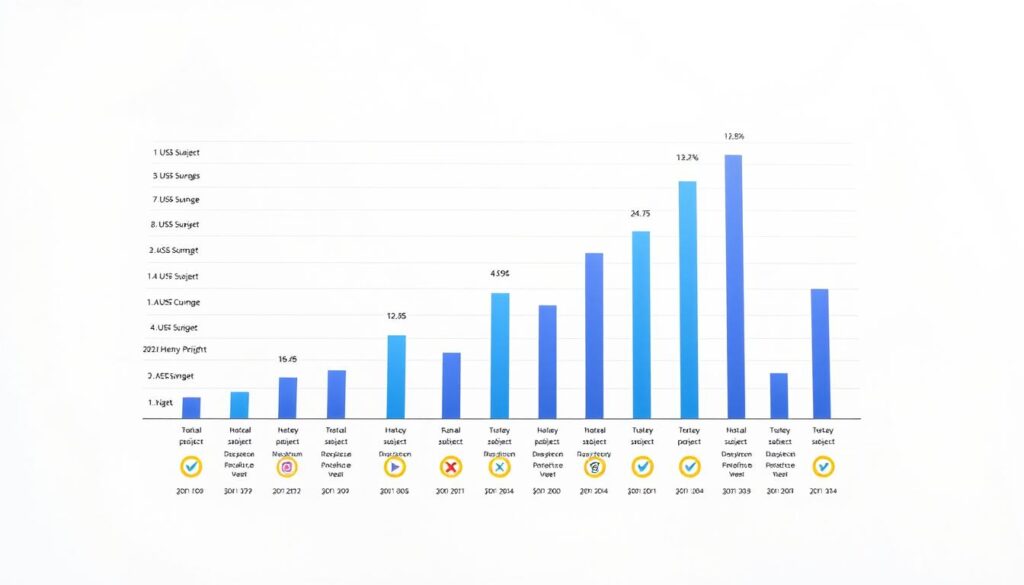Did you know that in 2014, mathematics surpassed English as the most popular A-Level subject? This shift highlights the evolving academic preferences of students and the growing emphasis on STEM fields. Understanding these trends is crucial for students aiming to excel in their A-Level exams.
A-Levels are a cornerstone of academic success, shaping university prospects and future careers. With entry numbers and grade distributions fluctuating over the years, especially during the pandemic, staying informed is more important than ever. Data from JCQ reveals valuable insights into these changes, helping students make informed decisions about their subject choices.
Mastery of A-Level subjects requires more than just studying. It demands strategic techniques, awareness of common pitfalls, and sometimes, the guidance of a skilled tutor. At Getutor, we specialize in matching students with the right tutors to overcome these challenges, ensuring they reach their full potential.
This article combines data-driven insights with practical tips to enhance your A-Level performance. Whether you’re struggling with math or refining your essay skills, we’ve got you covered. Our goal is to provide you with the tools and knowledge needed to succeed in your exams and beyond.
Key Takeaways
- Understanding trends in A-Level subject popularity can inform your academic choices.
- Strategic study techniques and awareness of common mistakes are key to success.
- Professional tutoring can provide personalized support to overcome challenges.
- Combining data insights with practical tips enhances exam preparation.
- Mastering A-Levels requires a blend of knowledge and effective study strategies.
Deep Dive into A-Level Subjects and Trends
Over the past two decades, A-Level subject choices have undergone significant shifts, reflecting changing academic and career priorities. Understanding these trends is essential for students aiming to make informed decisions about their academic paths.
Long-Term Trends and Data Insights
Historically, Mathematics has emerged as a dominant choice, surpassing English in popularity by 2014. This shift underscores the growing emphasis on STEM fields. Data from JCQ highlights a steady increase in total A-Level entries from 2001 to 2021, with notable changes following Curriculum 2000 reforms.
Changing Entry Numbers and Subject Popularity
The rise of STEM subjects like Science and Mathematics has been remarkable, while Humanities like History have seen fluctuations. For instance, Mathematics entries grew by 23% between 2001 and 2021, while English saw a 12% decline. These shifts highlight evolving student preferences and career aspirations.
| Subject | 2001 Entries | 2021 Entries | Change |
|---|---|---|---|
| Mathematics | 78,000 | 102,000 | +23% |
| English Literature | 82,000 | 73,000 | -12% |
| Science (Combined) | 65,000 | 89,000 | +37% |
| History | 45,000 | 51,000 | +13% |
These trends, coupled with grade distribution data, provide valuable insights for students. For example, in 2023, over 50% of A* and A grades were in core STEM subjects. Understanding such patterns can help students align their choices with both academic and career goals.
By analyzing these trends, students can make more informed decisions about their A-Level choices, setting themselves up for future success in their chosen fields.
Strategies to Master Your A Levels
Mastering A-Level subjects requires a strategic approach that combines effective study techniques with smart time management. Students can significantly improve their performance by adopting proven methods tailored to their specific courses.
Effective Study Techniques and Time Management
One of the most effective strategies is consistent practice and revision. According to recent reports, students who start focusing on past papers at least two weeks before exams tend to perform better. Attempting each past paper at least twice helps ensure a solid understanding of the material.
Breaking down modules into manageable sections, such as 20 focused areas, can make studying less overwhelming. Continuous revision throughout the year, rather than cramming, is highly recommended. Short, frequent study sessions with breaks are more productive than long, uninterrupted ones.
A well-structured revision timetable is essential. Students should estimate the number of 50-minute study sessions needed for each topic and stick to their plan. Research shows that students who begin revising just before or during Easter holidays often achieve better grades.
Choosing the right study environment is also crucial. Many students find that studying in a quiet, distraction-free space leads to better focus and retention. By combining these strategies, students can optimize their study habits and achieve higher grades.
Common Mistakes and Struggles in A-Level Studies
Every year, many students face challenges in their A-Level journey, often due to overlooked mistakes in subject selection and exam preparation. These pitfalls can hinder academic performance and stress levels, but with the right strategies, students can overcome them.
Pitfalls in Subject Selection and Preparation
One of the most frequent errors students make is choosing A-Level subjects without sufficient research. This can lead to a mismatch between their interests and abilities, ultimately affecting their grades. For instance, a student passionate about the arts might struggle in a STEM-heavy subject like Mathematics without proper preparation.
Additionally, many students underestimate the importance of structured revision plans. Without a clear timetable, they may find themselves overwhelmed during exam season. Recent data shows that students who start revising at least two months in advance tend to perform better and experience less stress.
Managing Exam Stress and Overload
Exam stress is another significant challenge. Students often mismanage their time, leading to poor performance. To combat this, creating a detailed study schedule is crucial. Allocating specific times for each subject helps maintain balance and reduces overload.
Moreover, practicing past exam papers is highly recommended. It not only familiarizes students with the exam format but also helps identify strengths and weaknesses. Students who regularly practice past papers often achieve higher grades and feel more confident during exams.
Research indicates that even top-performing students can struggle without the right support. For example, the recommended total study time per subject is 360 hours, which many students find daunting. However, with personalized tutoring, students can better manage their workload and focus on areas where they need improvement.
By addressing these common mistakes and implementing effective strategies, students can significantly improve their A-Level performance. At Getutor, we believe that with the right guidance, every student can overcome their challenges and achieve their academic goals.
Insights on most popular a levels
Visual insights reveal the evolving landscape of A-Level subject popularity. Data visualization plays a crucial role in understanding these trends, helping students and parents make informed decisions.
Data Visualization and Subject Rankings
Mathematics remains the top choice, with over 107,000 entries in 2024. This reflects a steady rise in STEM subject popularity, with Computing and Physics also seeing significant increases.
Modern Foreign Languages, such as Spanish and French, have grown in popularity. These trends highlight shifting student interests and the diverse career opportunities available.
The chart below illustrates these shifts, showing how Mathematics and Science subjects dominate, while languages and humanities maintain their appeal.
Data insights from entry numbers and grade distributions provide a clear guide. These tools help students align their choices with future academic and career goals.
By staying updated on these trends, students and parents can make decisions backed by clear, data-driven information, ensuring the best possible academic path.
Enhance Your Performance with a Private Tutor
Investing in a private tutor can significantly enhance your A-Level performance and open doors to top universities. Personalized guidance is key to overcoming academic challenges and achieving success.
Benefits of Personalized Guidance
A skilled tutor offers tailored support, enhancing study strategies and time management. Data shows that students with private tutors can see up to a 20% improvement in test scores, bridging gaps in complex subjects like STEM.
Individualized attention helps address specific struggles, boosting exam confidence. 70% of students feel more self-assured after tutoring, leading to better academic outcomes.
How Getutor Matches You with Expert Tutors
At Getutor, our free matching system connects students with expert tutors. We prioritize your needs, ensuring the right fit for your learning style and goals. Our success rates highlight the effectiveness of our approach.
Visit getutor.com.hk/en/findtutor to learn more about our process and how we support students in achieving academic excellence.
| Aspect | Group Learning | One-on-One Tutoring |
|---|---|---|
| Attention | Limited attention per student | Full focus on individual needs |
| Progress | Slow due to diverse needs | Accelerated, tailored pace |
| Engagement | Varies among students | High, personalized interaction |
As the saying goes,
“The right guidance at the right time can change a student’s trajectory.”
Additional Tips & Trends for Academic Excellence
Staying ahead in your A-Level journey requires more than just hard work—it demands smart strategies and a keen eye on emerging trends. Recent data shows a significant rise in STEM subject entries, with Computer Science and Mathematics leading the way. This shift not only reflects student interests but also aligns with future career opportunities in technology and engineering.
Emerging Subject Trends and Future Opportunities
Over the past year, entries in Computer Science have surged by 15%, while traditional arts subjects have seen a decline. This trend signals a growing interest in tech-related careers. Students opting for STEM subjects often find themselves well-prepared for in-demand fields like artificial intelligence and data science.
- STEM subjects are increasingly popular, offering strong career prospects.
- Computer Science entries have risen by 15% in the past year.
- Arts and humanities are experiencing a decline in popularity.
Leveraging Online Resources and Government Data
To stay informed, students and parents should utilize government websites like JCQ and UCAS. These platforms provide up-to-date insights on subject trends and university requirements. Regularly reviewing these resources can help make informed decisions about course choices and study strategies.
By staying updated and adapting to these trends, students can position themselves for success in their chosen paths. Remember, proactive research and strategic planning are key to achieving academic excellence.
Conclusion
In conclusion, excelling in A-Levels requires a combination of deep subject knowledge, strategic study techniques, and personalized support. Over the years, we’ve seen significant shifts in subject popularity, with STEM fields like Mathematics and Science leading the way, while Humanities like History have seen fluctuations. These trends, coupled with grade distribution data, provide valuable insights for students aiming to align their choices with future academic and career goals.
Effective study techniques, such as consistent revision and past paper practice, have proven to improve grades. Additionally, personalized tutoring has shown to enhance academic performance, with many students achieving up to a 20% improvement in their results. At Getutor, we specialize in matching students with expert tutors tailored to their needs, ensuring they receive the support necessary to excel.
For parents seeking to secure expert academic support for their child, we encourage you to explore our free tutor matching service at getutor.com.hk/en/findtutor. By recognizing changes in trends, adapting study strategies, and making informed educational choices, students can achieve sustained improvement and unlock their full potential.
FAQ
What factors should my child consider when choosing A-Level subjects?
Your child should consider their academic strengths, career goals, and university requirements. For example, STEM subjects like Mathematics and Physics are ideal for science-related careers, while History and Psychology may suit arts or social science pathways.
How popular are STEM subjects among students in England?
STEM subjects like Mathematics, Physics, and Chemistry remain highly popular. Last year, Mathematics was the most common A-Level entry in England, reflecting strong student interest in science and technology fields.
Can GCSE results predict A-Level success?
Yes, GCSE grades are a good indicator of A-Level potential. Students who perform well in their GCSEs, particularly in relevant subjects, often excel in their A-Level studies. However, dedication and effective study habits also play a significant role.
How can my child avoid common mistakes during A-Level studies?
Encourage your child to start revisions early, seek help from teachers or tutors when needed, and practice past exam papers regularly. Time management is crucial to balance academic and extracurricular activities.
What resources can my child use to research A-Level trends?
Your child can use government education data, school guidance counselors, and online resources like exam boards’ websites. These sources provide insights into subject popularity, entry numbers, and grade distributions.
How does Getutor help students master their A-Levels?
We provide personalized tutoring services, matching students with expert tutors who specialize in their subjects. Our approach focuses on individual learning needs, helping students achieve their academic goals efficiently.
Are arts subjects still a viable choice for A-Level students?
Absolutely. Arts subjects like Art and Design are excellent for students interested in creative fields. They also develop critical thinking and analytical skills, which are valuable for various university programs and careers.
How can my child manage exam stress and workload?
Encourage your child to create a study schedule, take regular breaks, and prioritize self-care. Seeking support from teachers or counselors can also help manage stress and maintain a healthy work-life balance.
What are the benefits of choosing less traditional A-Level subjects?
Less traditional subjects can offer unique career opportunities and smaller class sizes, allowing for more personalized attention. They also cater to niche interests, which can be beneficial for specific university programs or job markets.
How does Getutor ensure a good tutor match for my child?
We use a detailed assessment process to understand your child’s learning style, subject needs, and goals. Our experienced team then selects the most suitable tutor from our network of qualified educators.
What role does research play in A-Level success?
Research skills are essential for many A-Level subjects, particularly in Sciences and Humanities. Developing strong research habits helps students analyze information, form arguments, and prepare for university-level studies.
How can my child stay updated on A-Level trends and popularity?
Your child can review annual exam entry data, consult with school advisors, and follow educational blogs. These sources provide insights into subject popularity and emerging trends in A-Level studies.
Why is Psychology a popular A-Level choice?
Psychology is popular due to its relevance to understanding human behavior and its application in various careers. It also combines elements of science and social studies, appealing to a wide range of students.
How does Getutor support students applying to universities?
We offer guidance on subject selection, exam preparation, and university application strategies. Our tutors also provide mentorship to help students meet the academic requirements of their chosen universities.






